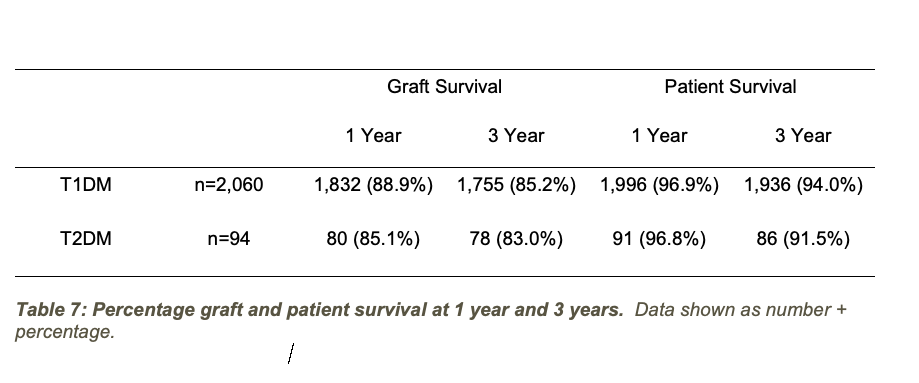Multi-centre UK analysis after SPK in recipients with Type 2 diabetes mellitus
Ruth Owen1, Thomas A. Kurian2, Harry J. Carr3, Claire Counter4, Emily J. Thompson1, James Shaw1, Colin H. Wilson1, Steve A. White1.
1Institute of Transplantation, Freeman Hospital , Newcastle Upon Tyne, United Kingdom; 2Newcastle Medical School, Newcastle University, Newcastle, United Kingdom; 3STRIVE Medical Education Centre, James Cook University Hospital, Middlesbrough, United Kingdom; 4Statistics and Clinical Research, NHS Blood and Transplant, Bristol, United Kingdom
Background: From 1994 - 2019 only 4% of simultaneous pancreas and kidney (SPK) transplants in the United Kingdom (UK) have been performed for recipients with Type 2 diabetes mellitus. The aim of this study was to compare outcomes after SPK transplantation for recipients with either Type 1 (T1DM) or Type 2 (T2DM) diabetes.
Methods: Retrospective data on all UK SPK Transplants from 1994 - 2019 were obtained from the NHSBT UK Transplant Registry, n=2,236. Current SPK selection criteria for Type 2 diabetes mellitus specifically requires insulin treatment and recipient BMI less than 30kg/m2 at the time of listing. Cases where the aetiology of diabetes was missing or had been classified as ‘other’ rather than specifically Type 1 or Type 2 diabetes were excluded, as were recipients who had received a re-transplant, resulting in a final cohort of n=2,154. Graft and patient survival analyses were conducted using Kaplan-Meier plots and Cox regression models. Complications were compared using chi-squared analyses.
Results: The majority of SPK transplants were performed in recipients with T1DM (95.6%, n=2,060), and 3.4% (n=94) were performed in recipients with T2DM. Recipients with T2DM were statistically significantly more likely to be older (p<0.0001), male (p<0.0001), with a higher body mass index (BMI) (p=0.0191) and not requiring dialysis (p<0.0001). Univariate analysis showed no statistically significant difference in graft (GS) or patient (PS) survival between recipients with T1DM or T2DM at 1 year (GS T1DM-88.9%, T2DM-85.1% p=0.120; PS T1DM-96.9% T2DM-96.8%, p=0.886) or 3 years (GS T1DM-85.2% T2DM-83.0%, p=0.316; PS T1DM-96.9%, T2DM-96.8% p=0.237). Multi-variate analysis also failed to reveal a statistically significant difference between graft (p=0.564, HR 1.221, 95%CI 0.619, 2.406) or patient (p=0.556, HR 1.280, 95%CI 0.563, 2.911) survival between these two cohorts. Common complications after pancreas transplant such as myocardial infarction, cerebrovascular accident, infection and rejection were analysed and again no statistically significant differences were seen between recipients regardless of type of diabetes.
Conclusions: This is one of the largest national studies evaluating outcomes after SPK transplants comparing recipients with T1DM or T2DM. Carefully selected recipients with Type 2 diabetes were not shown to have any statistically significant difference in graft or patient survival and had comparable rates of complications.

